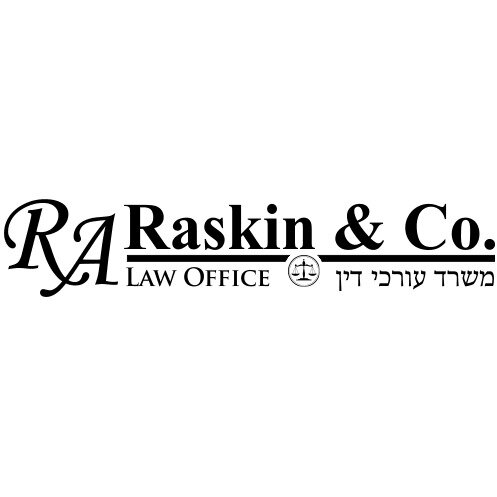Best Constitutional Law Lawyers in Israel
Share your needs with us, get contacted by law firms.
Free. Takes 2 min.
Or refine your search by selecting a city:
List of the best lawyers in Israel
About Constitutional Law in Israel
Constitutional Law in Israel is unique compared to many Western countries, as Israel does not have a single, written constitution. Instead, its constitutional framework is composed of a series of Basic Laws, which serve as a de facto constitution over time. These Basic Laws cover various aspects, including human rights, government structure, and judicial authority, creating an essential foundation for the state's legal and governmental system. The Supreme Court of Israel plays a crucial role in interpreting these laws and protecting the rights enshrined within them, often engaging in judicial review of legislation and government action.
Why You May Need a Lawyer
There are several situations where you might require legal assistance in Constitutional Law in Israel. Common cases include challenges to laws or government actions on grounds of constitutionality, issues related to civil liberties or human rights, or disputes concerning the interpretation or application of Basic Laws. Legal representation is also critical when dealing with freedom of speech issues, religious freedoms, or equality before the law complaints. Experienced constitutional lawyers can guide you through the complexities of legal processes and advocate on your behalf in higher judicial instances like the Supreme Court.
Local Laws Overview
Key aspects of local laws pertinent to Constitutional Law in Israel include the Basic Laws, which are as follows:
- Basic Law: The Government - Defining the structure and function of Israel’s government.
- Basic Law: The Judiciary - Establishing the framework of the judicial system and the independence of the courts.
- Basic Law: Human Dignity and Liberty - Protecting human rights and individual freedoms.
- Basic Law: Freedom of Occupation - Ensuring freedom in choosing one’s occupation.
These laws collectively form the constitutional fabric of Israel, guiding legislative and executive actions, as well as safeguarding individual rights against state power.
Frequently Asked Questions
What is the significance of Basic Laws in Israel?
Basic Laws act as a constitutional framework without being a formal written constitution. They cover key political, judicial, and individual rights aspects, and guide governmental conduct and legislation.
Can the Supreme Court invalidate legislation in Israel?
Yes, the Israeli Supreme Court can exercise judicial review over Knesset legislation, especially when such legislation conflicts with Basic Laws or infringes on protected rights.
What rights are protected under Israel's Basic Laws?
Basic Laws protect various rights, including human dignity, liberty, occupation, and certain freedom of expression rights. They also ensure the government treats all individuals fairly and equally.
How does the separation of religion and state operate in Israel?
Israel's legal system incorporates elements of religious law, particularly in areas such as marriage and divorce, while striving to balance between state and religious norms according to Basic Laws.
What role does the Knesset play in Constitutional Law?
The Knesset is responsible for enacting Basic Laws, effectively shaping the constitutional landscape, and it plays a crucial part in legislative processes that adhere to constitutional principles.
How does the Israeli legal system address human rights violations?
Human rights violations can be addressed through litigation in civil courts, with the Supreme Court overseeing constitutional challenges and issuing remedies if state actions contravene Basic Laws.
What is the impact of International Law on Israeli Constitutional Law?
While Israel recognizes international law principles, they are typically applied domestically only if adopted through legislation or harmonized with domestic law by the courts.
How are minority rights protected under Israeli law?
Minority rights are addressed in various legal settings, with significant influence from Basic Laws and Supreme Court interpretations that aim to protect these groups within the broader legal framework.
What legal measures exist for freedom of speech and the press in Israel?
Freedom of speech and press are protected under Basic Laws, subject to certain limitations to balance other societal interests, like national security or public order.
Can individuals bring constitutional cases to court in Israel?
Yes, individuals can bring cases challenging laws or state actions based on constitutional grounds, particularly when alleging infringements of rights protected under Basic Laws.
Additional Resources
Several resources can assist individuals needing advice in Constitutional Law:
- The Supreme Court of Israel: Offers insights into landmark cases and judicial interpretations.
- The Israeli Knesset: Provides information on legislation and Basic Law enactments.
- Israel Democracy Institute: Research articles and publications on constitutional processes and rights protection.
Next Steps
If you require legal assistance in Constitutional Law in Israel, consider reaching out to specialized law firms or individual lawyers with expertise in this field. You can start by conducting an online search for constitutional law practitioners or seeking referrals from legal aid organizations. Prepare to discuss your situation clearly, gather relevant documents, and be ready to explore the possibility of litigation or negotiation, depending on your specific legal needs.
Lawzana helps you find the best lawyers and law firms in Israel through a curated and pre-screened list of qualified legal professionals. Our platform offers rankings and detailed profiles of attorneys and law firms, allowing you to compare based on practice areas, including Constitutional Law, experience, and client feedback.
Each profile includes a description of the firm's areas of practice, client reviews, team members and partners, year of establishment, spoken languages, office locations, contact information, social media presence, and any published articles or resources. Most firms on our platform speak English and are experienced in both local and international legal matters.
Get a quote from top-rated law firms in Israel — quickly, securely, and without unnecessary hassle.
Disclaimer:
The information provided on this page is for general informational purposes only and does not constitute legal advice. While we strive to ensure the accuracy and relevance of the content, legal information may change over time, and interpretations of the law can vary. You should always consult with a qualified legal professional for advice specific to your situation.
We disclaim all liability for actions taken or not taken based on the content of this page. If you believe any information is incorrect or outdated, please contact us, and we will review and update it where appropriate.
Browse constitutional law law firms by city in Israel
Refine your search by selecting a city.
















